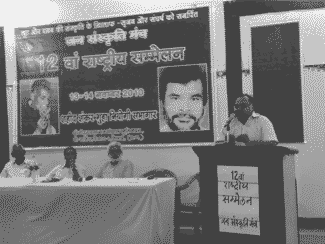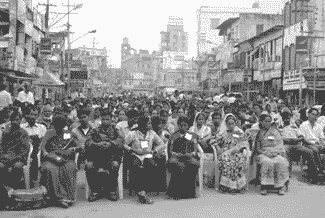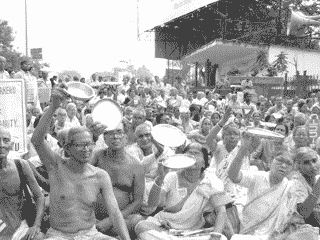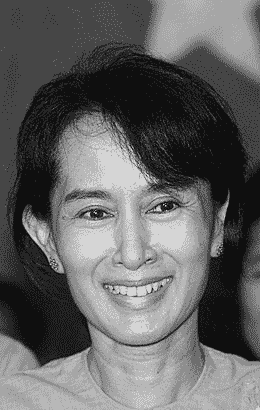
Manglesh Dabral, Ashok Bhowmik, Shobha Singh, Viren Dangwal, Ramji Rai, Madan Kashyap, Ravi Bhushan, Ramnihal Gunjan, Shambhu Badal, and Siyaram Sharma were elected National vice Presidents.
Muktibodh and Shankar Guha Niyogi, two symbols of creativity and struggle, were the focus of the conference. The inspiring rendition by comrades from Hirawal (Patna) of Andhere Mein (In the Dark), a poem by Muktibodh, rang through the Shankar Guha Niyogi Hall in Durg, and was followed by a play. The conference observed a minute’s silence to remember Comrade Ram Naresh Ram, student leader Comrade Rajesh, publisher and writer Sohan Sharma, theatre person Sivaram, poet Girda, and Amitabh Dasgupta.
The conference was inaugurated with the Muktibodh Memorial Lecture delivered by noted poet Manglesh Dabral. While speaking on the theme of the lecture – power and culture – he outlined how the state has become completely unrepentant on the oppression of various segments of society, whether it is US aggression in the Middle East, or the barbaric repression of adivasis, minorities, workers or dalits by the Indian state. He also stressed the need for literary and cultural interventions to combat the idioms of state, capital, and the market.
Professor Manager Pandey presided over the session. The well know poet, Nabarun Bhattacharya, underlined the need for a struggle inspired by Muktibodh and Shankar Guha Niyogi, a struggle that will stand up to global imperialist forces and their regional peddlers who are responsible for the oppression and displacement of the adivasis and toiling masses of this country.
The reading and discussion of the draft document took place on the second day. Addressing the delegates, Processor Manager Pandey said that it is equally important to remember our sources of hope - including struggles against US imperialism as witnessed in Cuba, Venezuela and people’s struggles against SEZs in India. He urged those present that each such resistance be documented and commemorated in an effort to give a direction to people’s aspirations expressed in various forms of cultural production today. He said that socialism is even more relevant today, and that cultural production would have to urgently be oriented towards the project of creating a socialist world view.
The conference was brought to a close with a performance by Patna Hirawal of a poem written by Dinesh Kumar Shukla in memory of Gorakh Pandey and a dramatisation of the poem Andhere Mein by Hirawal (Bhilai).
There were bookstalls at the conference venue, set up by the Lenin Pustak Kendra (Lucknow), Gorakhpur Film Society, and Samkaleen Janmat.
AISA Victories in Karbi Anglong and Garhwal
Karbi Students’ Association (KSA), an affiliate of AISA won the post of Vice President and General Secretary of Diphu Government College (DGC) Students’ Union. It is an outcome of the consistent student movement led by KSA-AISA. In Karbi Anglong Students’ Union elections were usually determined by different types of power tactics with arms and money power represented by NSUI and UPDS outfits. This time too the DGC election was declared to be held without photo identity card, so that usual strong arm tactics could be repeated. KSA’s strong opposition and movement against this compelled the authorities to defer the election, which was finally held on 9 October. Apart from fighting against privatization and commercialization of education and malpractices of anti-student outfits, KSA has been leading a student movement on a 10-point demand.
KSA candidate Thomson Rongpi (621 votes) won General Secretary defeating his nearest rival, an independent candidate backed by NCP leaders. NSUI came 3rd. VP candidate Lunce Timung of KSA won (864 votes) defeating the candidate of the KSA outfit (affiliated to the renegade ASDC) backed by the PAPA (Peoples’ Alliance for Peace Agreement, an open organization of cease-fire UPDS), who secured 720 votes, and NSUI was again 3rd (523).
The AISA candidate Verghese Bamola won the post of University Representative in HNB Garhwal University, Srinagar, Uttarakhand. The election was held on 23 October and it was won by AISA by a huge margin. Whereas Verghese Bamola secured 1349 votes, his nearest rival got 686 votes. The post of University Representative has become hotly contested by all student outfits recently as according to the Lyngdoh Committee recommendations election for the post of President and Secretary and VP, Jt. Sec, etc. can be contested only once. However, a student can contest twice for the post of UR and therefore this post gained political importance. The runner up has a NSUI background while the ABVP candidate and outgoing Union Secretary was pushed to the third spot. This victory of AISA is a result of AISA’s leadership role provided to the student community when they are witnessing a series of assaults on the Democratic traditions of University in various forms by the new VC.
8th State Conference at Tripura
CPI(ML) held its 8th state Conference of Tripura on 20-21st November at Agartala. “Carry forward peoples’ movement, strengthen the revolutionary left” was the central slogan of the conference. The Conference started with a mass rally on 20th November in the main road at the heart of Agartala city. About 800 people in colourful processions from different parts of Tripura participated in the rally with significant participation of poor tribals, Muslims and women.
 The rally was addressed by State Committee member and AICCTU President Com. Partha Dey, State Committee member Com. Subirjeet Singha, State Secy. Com. Mrinmoy Chakravorty, PB member Com. Rubul Sarma and General Secretary Com. Dipankar Bhattacharya. In his speech Com. Dipankar, said that the opportunist left in India is in deep crisis and its government in Tripura is not any exception. In this situation genuine left sections within the CPI(M) fold are disillusioned with their official line and coming closer to our revolutionary stream. In this back drop All India Left Coordination has been formed and some initiatives have been taken in different states. He asked why the Left Front government in Tripura continues to impose the draconian Armed Forces (Special Power) Act in large parts of the state despite massive protests against this draconian Act in the entire North East.
The rally was addressed by State Committee member and AICCTU President Com. Partha Dey, State Committee member Com. Subirjeet Singha, State Secy. Com. Mrinmoy Chakravorty, PB member Com. Rubul Sarma and General Secretary Com. Dipankar Bhattacharya. In his speech Com. Dipankar, said that the opportunist left in India is in deep crisis and its government in Tripura is not any exception. In this situation genuine left sections within the CPI(M) fold are disillusioned with their official line and coming closer to our revolutionary stream. In this back drop All India Left Coordination has been formed and some initiatives have been taken in different states. He asked why the Left Front government in Tripura continues to impose the draconian Armed Forces (Special Power) Act in large parts of the state despite massive protests against this draconian Act in the entire North East.The delegate Session was held in Shaheed Govida Teli Auditorium and Virchand Harendra Manch (Women College Auditorium). The inaugural speech was delivered by Central Committee observer Com. Rubul Sarma. After that State Party Secretary Com. Mrinmoy Chakravory placed the draft document for discussion.
On 21st November delegates deliberated on the draft report, emphasising the urgency of taking bold initiatives of the deprived classes, highlighting the fact that 67% of the people of the state are still under BPL, that tea garden workers continue to be denied proper wages and victims of barbaric exploitations, that the aspirations of the tribals and Muslims remain unaddressed along with widespread repression across the state. After the document was adopted, a 15-member state committee was elected and Mrinmoy Chakravorty was re-elected as State Secretary.
Party General Secretary Com. Dipankar Bhattacharya in his concluding speech emphasised recounted the tradition of heroic struggles of Tripura comrades and reminded how in the 1980 Huruwa massacre 7 state comrades sacrificed their lives. He urged the delegates to uphold this legacy of struggle and sacrifice and carry the movement to new heights in the state.
Ambattur: A Year of Struggle of Women Garment Workers
Over the last one year, women workers of Bombay Rayons Ltd, an export garment factory in Ambattur Industrial Estate in Chennai have scripted a story of determined struggles. In the two units of the factory there are over 1350 workers of whom 1185 are women. They formed their union in 2009 August and hoisted the AICCTU flag on 14 August, saying that hoisting the AICCTU flag is a celebration of their freedom, achieved on joining the union. They hoisted AICCTU flag in the second unit the next month.
They began a strike on September 30, 2009 which continued for 14 days forcing the management to pay 12.85% of the gross salary as bonus against its group policy of only 8.33%. During the strike, they spoke to the bus corporation officials and managed to arrange a separate bus to take the workers to gherao the labour-office which is about 12 km away from the plant.
From February 2010 they began their struggle for wage revision and when the management refused to yield, they controlled production. The management served charge sheets for the office bearers and when they refused to receive them, the charge sheets were served at home. Workers went on a 3-days strike and forced the management to withdraw the charge sheets including those served on the male workers. The management also agreed for a one-year wage settlement from April 2010 to March 2011. For the first time Bombay Rayons workers got an increase ranging from Rs. 90 to Rs.500 in their salaries.
In the General Body held in June 2010, workers decided to increase the membership, hold regular gate meetings and study circles. On August 5, when one of the managers used degrading language against a worker who did the overtime duty of another worker, production was immediately stopped and the workers demanded an apology; work was resumed only after their demand was met.
On August 14, 2010 they again hoisted AICCTU flag and celebrated one year of struggle against the management for dignity and better working conditions.
On August 21, 400 of them involved in the 5-lakh signature campaign of AICCTU. Apart from participating en masse in the campaign, they also got 11,400 signatures in their living areas.
Time for next bonus was approaching and when the management said they would not pay extra bonus this time against the group policy and asked the workers to improve efficiency and productivity, workers unitedly stood up once again. When the management tried to recruit workers on piece-rate for cutting and ironing work, existing workers established dialogue with the piece-rate workers and forced the management to backtrack.
On October 27 the management unilaterally announced 8.33% bonus and on October 28 deposited it in the bank accounts of the workers. On the same day workers of unit 1 and the next day of unit 2, surrendered their ATM cards and demanded that they be paid directly. Management did not withdraw the payment and another spell of struggle started from October 29. This time it was hunger strike and on the first day itself 17 women workers fainted. TN government’s free ambulances and 108 were called and they were hospitalized. Police arrived; TV channels covered the development at the factory site, leading to widespread exposure of the management’s highhandedness. Workers returned to work on November 1 the labour office invited the union for talks and the management agreed before the labour office to pay 12.85% bonus.
In the meantime when on November 1 AICCTU State Secretary S Sekar, and AICCTU State Council Member Com.Munusami went to the factory to inform the workers about the management’s decision to release 12.85% bonus and to ask them to wait for the talks with the labour office, the security in the gate did not allow the comrades to go inside the factory, on the plea that the union is not recognized by the management. All the workers left the factory, came to the gate, raised slogans, took the comrades to the canteen and held a meeting there! On the same day they held a gate meet demanding justice for the accident death of a woman worker of Nokia factory at the work spot.
In the meeting they planned to go for strike if the management attempted any complaint on the comrades for ‘unauthorized’ entry. The management could not do that. They also decided that they would not use the ATM cards anymore, they should get either the salary or the bonus in two days and till then they would wear black badges.
The management again had to give in before the determined workers, forced to pay the salary on November 4, and promised to pay the bonus before 30 November.
The management has told the union that it is ready to hike the salary in January or February of 2011 though it is due only in April 2011.
In March 2010 the management attempted to introduce Sumangali Scheme (where young women work, virtually imprisoned on factory premises, not for a salary but towards a bulk amount for their marriages) in the Chennai factory to tackle the unionized women workers. It recruited around 40 girls and gave them shelter and food, brought them to the factory in a separate bus and was vigilant that they do not interact with these unionized workers. But the unionized workers immediately raised the issues of poor accommodation and low quality of food of the Sumangali Scheme workers. The management wound up the scheme saying that it is very difficult to train them. Thus the management does not want to lose the trained workers and this has forced management to continue production in the ‘trouble-ridden’ Chennai factory, despite the fact it has plants in Kerala, Karnataka and Maharashtra, where it is getting away by paying much lesser salary.
In spite of heavy rains and cyclone on November 7, workers attended an AICCTU meeting on Russian Revolution Day. Workers who spoke in the meeting said that they are treated by the management with dignity only after unionization and that they would not compromise on this score in the coming days.
Workers of Gouripore Jute Mill Hold Rally
The workers of the Gouripore Jute Mills, a closed mill since 1997, organised a Hunger Rally, baring their bodies and brandishing empty plates to signify the struggle of workers at starvation point. On 15 November, from Sealdah station to Esplanade under the leadership of BCMF (AICCTU), more than 500 workers participated in this spirited rally, marked by the overwhelming presence of women. They displayed posters, placards and red flags and the rally resounded with the sound of slogans and beating plates. The rally blockaded the busy 4-point Esplanade crossing for some time. The rally converged at Metro, where a Dharna was held till 5 PM.

The rally demanded disbursement of their legitimate PF and pension dues forthwith. It is to be mentioned that the Calcutta High Court passed an order, directing the PF department to disburse PF to the workers, which the PF department flouted. Com. Gayatri Das, one of the leading organisers of the rally, addressed the gathering, exposing the role of the local CPIM MLA and present Transport Minister Sri Ranjit Kundu, who hobnobbed with criminals and the corrupt nexus of the erstwhile PF trustee Board and openly opposed the workers’ just demand of PF-Pension disbursement. Com. Ramshakar Paswan, another organiser of this movement, spoke of the sustained struggles of workers under the banner of the BCMF (AICCTU). Sri Somnath Basu of 'Naihati Shilpa Bachao Manch', and Sri Bankim Dutta, an organiser of the science movement, also addressed the gathering.
Prominent Trade Union leaders of AICCTU, AIUTUC, UTUC, Comrades Rabindra Prasad, Amal Sen and Barun Choudhury expressed their fighting solidarity with the ongoing movement. Prominent intellectual and economist Sri Subhendu Dasgupta, Columnist Pachu Roy, Convenor of Nagarik Manch Sri Naba Dutta, and Prof. Sri Salil Biswas also greeted and cheered the fighting workers. The meeting was also addressed by AICCTU & BCMF leaders Comrades Basudev Bose, Subrata Sengupta, Dibakar Bhattacharya, Batokrishna Das, and Atanu Chakravarty.
Bar Council of India (BCI) Tries to Bar the Practice of Law!
The Bar Council Of India’s (BCI) absurd proposal to start conducting an all-India level mandatory ‘entrance exam’ – which all qualified lawyers will have to pass in order to start practicing law – has understandably met with large protests across the country. The BCI is trying to justify this exam (called the ‘All India Bar Examination’ AIBE) by claiming that the existing poor quality of the legal profession has to be ‘enhanced’, and therefore an exam is required to ensure that all practicing lawyers confirm to some basic standards.
Whether it is law, medicine, engineering or any other profession, the quality of higher education in this country has steadily been compromised primarily by the state-sponsored policies of commercialization and privatization. Private colleges and universities are mushrooming all over the country, practically offering degrees for sale. These so-called ‘educational institutes’ more often that not lack even basic infrastructure or a well-qualified faculty, while charging exorbitant fees.
Rather than taking strict measures to curb these education shops, the BCI wants to further punish students (who have already borne the brunt of privatization) for the ills of privatization by rendering their degrees useless! Nothing can be more bizarre and illogical. The only outcome of this policy will be to restrict the legal profession to the elite – it will act as an effective barrier preventing students from deprived backgrounds from practicing law and pursuing a decent career.
If the BCI has no confidence in the degrees offered by some law colleges, no confidence in the abilities of students who have been certified to be eligible by these colleges, then this raises serious questions of the efficacy of our regulatory systems. Why is no action being taken on these colleges to improve their infrastructure and facilities?
The BCI has in the past too tried to restrict the conditions for enrollment as an advocate. At that point, the Supreme Court explicitly overruled the BCI and disallowed it from adding any conditionality for enrolment (beyond section 24 of the Advocates Act). Therefore, this latest move to introduce passing in the AIBE as a precondition for practicing law is essentially an underhand method of achieving the same end of restricting the legal practice to a select, elite few. Enrolment in the BCI without the right to practice is meaningless – it will only result in those students who have not passed the AIBE being exploited and made to work on practically no wages, even though they are qualified lawyers.
More disturbingly, the task of conducting the AIBE has been entrusted to a private firm (called Rainmaker). Who will now be responsible for the uncorrupt, transparent functioning and efficacy of the entrance exam, when the state has washed its hands off the whole affair?
AISA has already launched an agitation against the AIBE. Students studying in law colleges in Salem, Chenglepet, Chennai and Coimbatore participated in a protest at the Tamil Nadu Bar Council office in Chennai. Many students were arrested by the police, though they were later released. Earlier AISA students in Davangere (in Karnataka) had also protested against the decision to hold the AIBE. In continuation with these agitations, 3rd December 2010 will be observed by AISA as the National protest day against AIBE.
